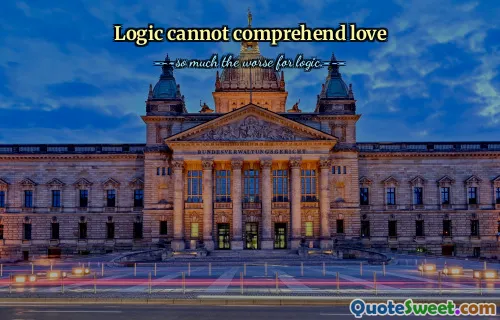The author presents a critique of conventional logic, arguing that reliance on logic can lead to misguided conclusions. They suggest that strict adherence to logical frameworks often overlooks the complexities of real-life situations. Rather than serving as absolute truths, logical premises can sometimes be too simplistic and fail to capture the nuance of human experience. This raises the question of whether logic is truly an effective tool for understanding the world.
Additionally, the author highlights examples where logical reasoning leads to paradoxes or contradictions. They emphasize that the rigid nature of logic can prevent flexible thinking essential for problem-solving. In complex scenarios, emotional and intuitive judgments may prove to be more relevant, suggesting that logic alone is insufficient for reaching a comprehensive understanding of human behavior and decision-making.
Ultimately, the author calls for a more balanced approach that incorporates emotional intelligence and contextual awareness alongside logical reasoning. Acknowledging the limits of logic allows for a more nuanced view of issues, promoting a holistic understanding and better outcomes in both personal and societal contexts. The text challenges readers to rethink the role of logic in their analyses and decisions.
More »
Today Birthdays
1970 -
Shonda Rhimes
1599 -
Edmund Spenser
1940 -
Edmund White
1957 -
Lorrie Moore
1691 -
George Fox
1961 -
Wayne Coyne
1934 -
Carolyn See
1965 -
Bill Bailey
1967 -
Masha Gessen
1937 -
George Reisman
1890 -
Elmer Davis
1978 -
Nate Silver
1884 -
Sophie Tucker
1960 -
Matthew Bourne
1980 -
Maria de Villota
1977 -
Orlando Bloom
1976 -
Michael Pena
1952 -
Geoffrey Canada
1951 -
Frank Peretti
1955 -
Trevor Rabin
1808 -
Salmon P. Chase
1947 -
Robert Martin
1927 -
Sydney Brenner
1926 -
Carolyn Gold Heilbrun
1954 -
Denise Morrison
1960 -
Eric Betzig
1968 -
Traci Bingham
1919 -
Robert Stack
1970 -
Keith Coogan
1989 -
Beau Mirchoff
